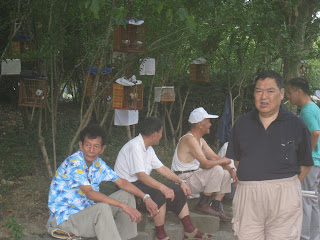

After seven years of planning and months of last minute house-cleaning, 8-8-08 arrived and from what I could see, the Shanghainese were ready to celebrate--freely, in many ways. In Zhabei, the Southwestern neighborhood I'm staying in, the locals watched the opening ceremonies on several huge LCD screens on the sides of buildings in the 2-year-old, upscale Western shopping area, Daning. (The Chinese are wonderful singers and from my few days here, it seems they have songs for everything. Those same LCD screens that showed the Olympics last night normally show the song and music video for the Daning shopping center. It's titled "City Living At Daning" and is regrettably infectious.) Zhabei is a middle-class neighborhood, from what I can tell, with many poorer people, thus about 200 people going into the shopping mall to watch the Olympics; they don't have their own televisions. Daning was built for what I've heard is a growing expat community in Zhabei, although I have yet to see many other white people in Zhabei.
In downtown Shanghai, I have to assume most people are affluent enough to have their own TVs because there was no public showing of the opening ceremonies and there was NO ONE on the streets. My fellow Meigouren (Americans) and I went to an expat bar, Windows, to watch the ceremonies. Though expat bars in other countries can be a sea of white people, it was about 50/50 Europeans, with a smattering of Australians and Americans, and Chinese women (very few men).
In the video (which I can't upload now, but I will in a few hours), you can here the Chinese in the bar chanting "Jia Yao Zhonggou," Go China, over and over again. I only have about 25 seconds recorded here, but the chant went on for more than two minutes. There was a similar chant for Yao Ming at the beginning, but I didn't catch that. Interestingly, the crowd cheered: Cuba, Canada, Australia, Iraq, beautiful women and fat men. The crowd booed France and Japan, throwing things at the screen during both teams' entrances. The crowd would laugh anytime there was a small island country (black skin is a laughable taboo here). And though most people cheered for the U.S. they booed President Bush.








 Zhabei park is an expansive neighborhood park that occupies more than two city blocks. Until five years ago, visitors had to pay two kuai (roughly $.25). Now it's free and the hub for hundreds of morning exercisers, dancers and men who want to take their caged birds for outings.
Zhabei park is an expansive neighborhood park that occupies more than two city blocks. Until five years ago, visitors had to pay two kuai (roughly $.25). Now it's free and the hub for hundreds of morning exercisers, dancers and men who want to take their caged birds for outings. 
 Though I arrived in Shanghai Saturday afternoon, sever jet lag didn't hit me until Monday morning. I woke at 3:30 a.m. Fortunately, I had read enough about Chinese culture to know that mornings are the most active time of day for many Chinese people. I'm currently staying in Zhabei, a southwestern neighborhood of Shanghai where people are more Earthy than the average Shanghainese. Because of this, morning time features many older people walking and younger people setting up their days' wares in the market or on Yanchang Lu. However, the bulk of Zhabei's morning crowd goes to Zhabei gong yuan, or Zhabei park. As my program director said when giving me a tour of the park Tuesday morning, Zhabei is at its carnival best first thing in the morning.
Though I arrived in Shanghai Saturday afternoon, sever jet lag didn't hit me until Monday morning. I woke at 3:30 a.m. Fortunately, I had read enough about Chinese culture to know that mornings are the most active time of day for many Chinese people. I'm currently staying in Zhabei, a southwestern neighborhood of Shanghai where people are more Earthy than the average Shanghainese. Because of this, morning time features many older people walking and younger people setting up their days' wares in the market or on Yanchang Lu. However, the bulk of Zhabei's morning crowd goes to Zhabei gong yuan, or Zhabei park. As my program director said when giving me a tour of the park Tuesday morning, Zhabei is at its carnival best first thing in the morning.